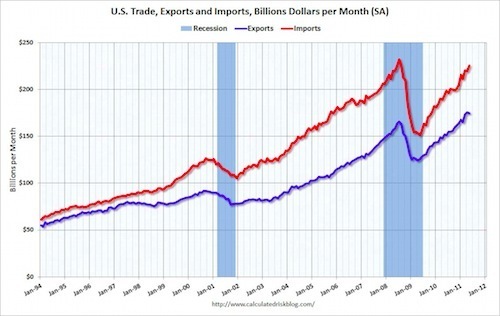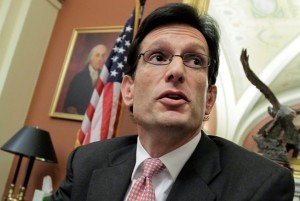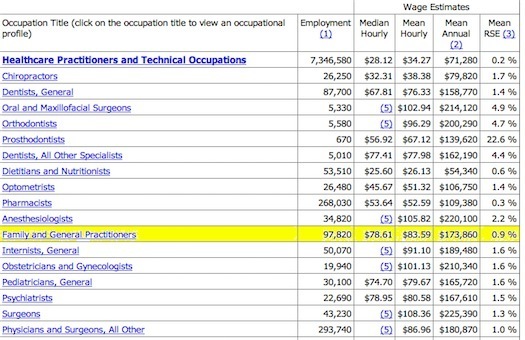Matthew Yglesias's Blog, page 2244
July 13, 2011
Health Care Professional Earnings
The BLS' giant table of what different professions earn is fascinating. Here's some data on health care professionals, dramatizing the extent to which our current compensation structure shortchanges GPs (click for a bigger one):
This kind of thing tends to bias the health care system away from the promotion of good health and toward the more expensive and less useful treatment of serious illnesses.


Trade Deficit On The Rise Again
It's totally impossible to get America to full employment through an increase in net exports. But given that there seems to be no sign of getting back to full employment through fiscal or monetary stimulus, the most optimistic story I can sketch goes like this. An increase in net exports increases employment somewhat. That increase in employment increases the rate of household formation. With household formation increasing, construction activity picks up again to reflect the undershooting we've been doing. With exports and construction back, we start seeing some uptick in retail and food service, and now state and local tax revenues are back so the public sector layoffs can halt.
Unfortunately, yesterday's trade figure show the trade deficit ticking back up again:

The good news is that exports are now above the pre-recession level, and we can hope they'll continue to rise fueled by growth in developing countries. But on imports, as Mark Doma emphasizes, oil put us on the path toward a higher deficit: "Oil imports returned to normal levels in May (in quantity of barrels imported) and prices went up. Therefore, how much we spent on foreign oil shot up by billions of dollars, with oil accounting for ¾ of the increase in imports in May."
Taxing oil imports and spending the money on domestic infrastructure seems to me like a very good deal.


Federal Reserve Needs To Reload, Not Retreat
If you need more evidence that Alan Blinder is mistaken and the Federal Reserve isn't "out of ammunition," then look no further than Ben Bernanke's statement to Congress that he's considering extra stimulative measures.
Considering is good. Actually pulling the trigger would be even better. The truth about monetary policy throughout this recession is that, as Bernanke said of Japan, we've faced "self-induced paralysis" and a lack of "Rooseveltian resolve." There are various downside risks involved in any bold new stimulative approaches, but there are also serious risks involved in failing to restore robust growth.


On "On Point" Today
I'm going to be on today's episode of WBUR's "On Point With Tom Ashbrook" talking debt ceiling with Laura Meckler from the Wall Street Journal, Jerome Powell from the Bipartisan Policy Center, and Reihan Salam from National Review. The show airs on a whole bunch of different NPR affiliates around the country but at different times. You can get a WBUR livestream over the internet here.


Revival In Manufacturing Employment Seems Unlikely
I'm guessing the long-term trend toward more manufacturing output but fewer manufacturing workers is going to continue:
Printers like this are not, of course, going to eliminate factories imminently. But especially as Chinese wages rise, more and more automation will be the name of the game.


Breakfast Links: July 13, 2011
— Low-tax egalitarianism in Australia.
— Newt Gingrich says McConnell's plan is surrender.
— John Cochrane thinks tax cuts boost revenue.
— The CIA shouldn't impersonate public health workers.
— Now it's austerity for Italy and junk bond status for Ireland.
— Jonathan Rauch continues blogging from 2004.
— "Only 23 percent of Americans benefit from the mortgage deduction, but 93 percent support it."
— American expats pursuing the American dream in China.


July 12, 2011
Unemployed Americans Victimized By Underrepresentation In The Senate
By Matthew Cameron
In response to Catherine Rampell's article in the Sunday New York Times about the stunning lack of political attention devoted to the modern unemployed, David Leonhardt posited that a reason for this phenomenon may be the concentrated nature of the jobs crisis. Specifically, he noted:
In 1982, the unemployment rate averaged between 9 and 10 percent — and fully 22 percent of the labor force experienced unemployment at some point during the year. In 2009 (the most recent year of data), the unemployment rate also averaged between 9 and 10 percent, but only (or maybe "only") 16.4 percent of the labor force experienced unemployment at some point during the year.
Just as surprising, the share of the labor force that experienced unemployment in 2009 was lower than in the early 1960s, when the unemployment rate was generally below 7 percent.
As it turns out, the unemployed aren't merely a narrower slice of the American electorate than in previous downturns. They also are concentrated in highly populous states that are severely underrepresented in the Senate.
In 2010, there were 17 states with working age populations that exceeded the per-state average. Among these states, which accounted for 70 percent of the U.S. working age population, the average unemployment rate was 9.9 percent. The other 33 states with below average working age populations, however, had an average unemployment rate of 8.2 percent.
The situation is even starker when looking at the extremes. The average unemployment rate among the 10 most populous states was a whopping 10.3 percent in 2010. Among the 10 least populous states, however, average unemployment was only 7 percent. Despite the fact that the former group comprises 54 percent of the U.S. working age population and the latter group only 3 percent, the nation's system of political representation grants each an equal-sized voting bloc in the Senate. Thus, the unemployed possess even less clout than one would expect since they tend to reside in states that afford them very little political power per capita.
Overall, this bolsters Rampell's thesis that there are a variety of historical and institutional factors conspiring to make the modern unemployed invisible. Yet it also casts doubt upon her suggestion that the unemployed could attract the attention of politicians by simply turning out to vote. After all, no matter how much mobilizing took place among the 2.3 million people who made up the 12.4 percent of California's workforce that was unemployed at the time of the 2010 elections, they still would've only had the opportunity to vote for as many senators — one — as did the 96.1 percent of North Dakota's labor force (roughly 356,000 people) that was happily employed.


The Consumer Surplus Of The Internet
Tyler Cowen has a couple of posts up questioning the idea that the Internet results in some giant unmeasured consumer surplus.
The main thing I have to add to this is from what I know of blog traffic statistics. In short Traffic is highest during the 12 hours between 9 a.m. and 9 p.m. Eastern Time that reflect when people are at work. Traffic tends to peak during the time when people are at the office in all four American time zones. Traffic is much higher on weekdays than on weekends. Traffic is much lower on holiday Mondays than on regular Mondays. Traffic is much lower during the Monday, Tuesday, and Wednesday before Thanksgiving than on normal Mondays, Tuesdays, and Wednesdays. Traffic is unusually low during the whole week between Christmas and New Year's Day.
This is a long-winded way of saying that people read things on the Internet primarily when they're supposed to be working. One interpretation of that is that the consumer surplus is pretty small. People don't want to spend their leisure time reading my blog. But there are other interpretation. Maybe "ability to surf the web at work" is enormously valuable to people, but people also spend enough time at work that this leaves them basically sated.


Full Employment Is A Worker's Best Friend
On Twitter earlier today, Ned Resnikoff remarked that "Without once addressing it directly, this Mac McClelland piece makes the case for why we need organized labor."
Maybe. Certainly "the Warehouse of Soul-Crushing Sadness" sounds like a pretty bad place to work. But I think the moral of the story here is the one she does directly address, the fact that sky-high unemployment deprives workers of all bargaining power:
A few days later, I had breakfast with someone who coincidentally works with the CEOs of logistics companies. Telling him about the conditions and the sterility and the mind-numbing sadness of the warehouse made him almost too bummed to eat his oatmeal. "Somebody did studies and spreadsheets and crunched those numbers," he said, "and figured out that the cheapest way to get that job done is to treat people like that." Which is important, he explained, because "the profit margins on those contracts are razor thin." Of course. A lot of the Internet retailers' merchandise is nearly worthless—ice princess star-shaped ice cube trays, cheap sunglasses, anthropomorphic stuffed bacon toys—and is sold for nearly nothing, often with free or reduced-price shipping.
Susie told me it's pretty dispiriting to act as though her workers are as disposable as the products they're shipping. But that's just the way it is, she said. The logistics clients aren't interested in spending money on a better or more sustainable work culture. Nor do they need to. There are 100 people employed in the warehouse I visited, and Susie could fire every one of them today without costing her bosses a dime of lost profits. She has applications from hundreds of people ready to take the job.
A strong labor union would certainly improve conditions at this warehouse around the margin. But there's a real limit here, since the threat of the company losing its contracts and everyone ending up unemployed is going to be extremely severe. The real issue here is that instead of workers threatening to leave this crappy job and get a better one, people are clamoring to work at this warehouse. This is one small glance at why I keep urging progressives to start caring about monetary policy more. Nobody considers themselves a monetary policy activist. But if you're interested in labor and working conditions, you've got to be interested in full employment. Full employment gives workers meaningful leverage. Mass unemployment gives it all to the bosses. In strict dollars and cents terms, I think everyone is better off with prosperity than with sluggish growth. But in terms of power, mass unemployment is a boon to bosses.


Eric Cantor Takes Bargaining Positions Out of Context, Poisoning The Atmosphere Of Future Negotiations

The cardinal principle of grand bargaining is that "nothing is agreed to until everything is agreed to." In other words, if you're going to have a balanced agreement in which Democrats agree to do some things Republicans want in exchange for Republicans agreeing to do things Democrats want, you need to be able to talk about those "things" in a conditional way. For example, I would be willing to index Social Security benefits to the Chained CPI (a small benefit cut) if we also indexed tax brackets to the Chained CPI (a modest tax increase). But that doesn't mean I've "agreed" to index Social Security benefits to the Chained CPI. It's a bargaining chip.
Eric Cantor who, despite some appearance to the contrary, isn't too stupid to understand this has decided to pretend not to understand it. In an earlier phase of negotiations headed by Joe Biden, the White House was prepared to entertain almost $2 trillion in cuts in exchange for Republicans agreeing to some tax increases. But Republicans rejected that, because they reject tax increases. Then later, President Obama tried to up the ante by suggesting $4 trillion in deficit reduction, again balanced between spending cuts and tax increases. But Republicans rejected that, because they reject tax increases. Now Cantor has put together a slide show based on the false premise that a bipartisan "Biden Framework" existed to do the almost $2 trillion in cuts. And his proposal is that instead of doing the $4 trillion in deficit reduction, they just implement the made-up framework.
The whole thing strikes me as laughable. But I do think it's important to appreciate that this kind of partial leaking of the contents of negotiations has the tendency to poison the atmosphere. The whole reason that "nothing is agreed to until everything is agreed to" is that to reach a bargain you need to have a pretty open and flexible discussion. If everyone in the room knows that Cantor has no compunction about misrepresenting every discussion as an agreement, it merely makes it that much harder for people to negotiate in a serious way.


Matthew Yglesias's Blog
- Matthew Yglesias's profile
- 72 followers




